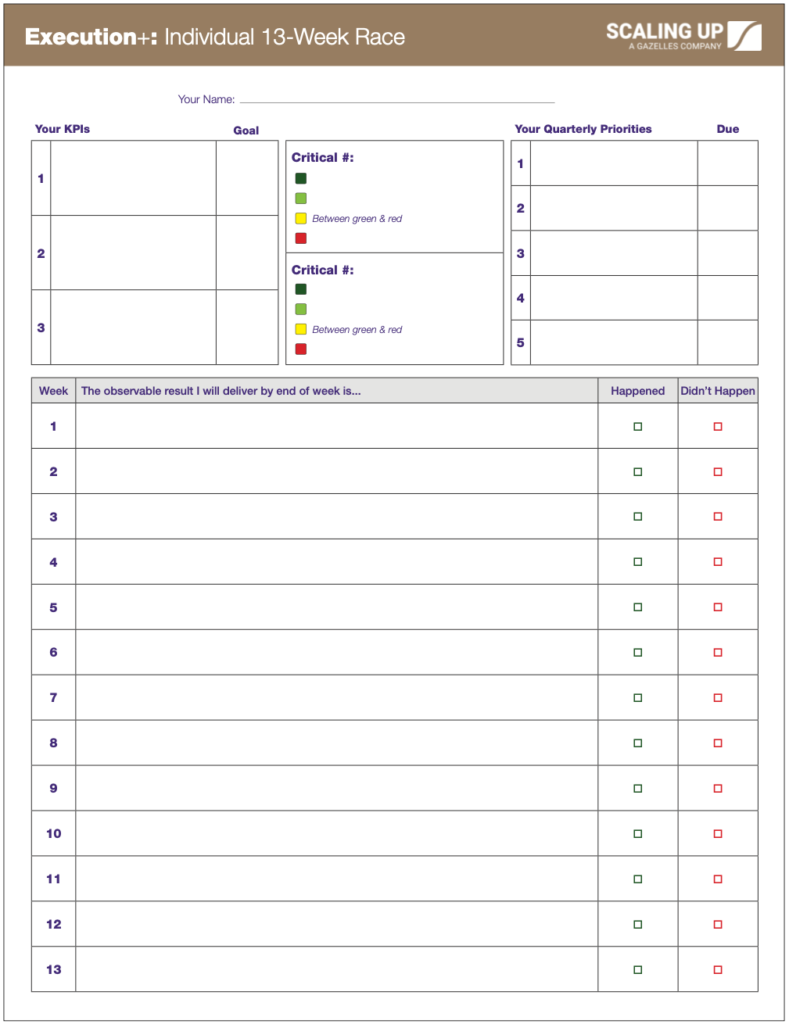In Scaling Up, we have this notion of a Rock. They are the most important item(s) to work on during the quarter. I typically advise my clients on building Rocks that roughly amount to 4 hours per week, over 12 weeks, or approximately 50 hours or more of work per Rock, per quarter. When teams don't clearly define their Rocks at the start of the quarter, they stumble out the gate.
During two-day off-sites and Quarterly planning sessions, teams are often energized and ambitious. There is a palpable sense of "can do" and eagerness to get moving on meaningfully work. This is the time to go deep on the selected Rocks and define them clearly before the session ends and team members return to their day-to-day roles.
In the interest of time, I've made the mistake of letting teams detail their Rocks outside the planning session. Nearly every time I've permitted this, I've received 50% completion of the Rock details in the week following the session. It's not till 2 to 3 weeks after the session that the team members have taken the time to define their Rocks. At that point, 10 weeks remain in the quarter, and the likelihood of Rock completion is threatened.
Take the time to solidify the Rocks as soon as possible, ideally during your planning session.
Below is how I advise teams on building solid and achievable rocks and keeping them in FAST format, rather than SMART format. In short, FAST is Frequently Discussed, Ambitious, Specific and Transparent.
- Clearly define the Rock title with success criteria.
- Poor Example: Fix the sales funnel.
- Strong Example: Modify the sales funnel to increase the customer conversion rate from 12% to 16% or better.
- Define when the Rock is truly complete.
- All Rocks will default to a completion date by the end of the quarter; however, the "done" criteria is when the team agrees the Rock is accepted as done. This means spelling out precisely what is agreed on by the team. In the above example, it looks like this:
- The CRO has reviewed and signed off on the funnel changes before implementation.
- The sales funnel is live and active three weeks before the end of the quarter.
- The average conversion rate of the three weeks meets or exceeds 16%.
- All Rocks will default to a completion date by the end of the quarter; however, the "done" criteria is when the team agrees the Rock is accepted as done. This means spelling out precisely what is agreed on by the team. In the above example, it looks like this:
- Break down how the next few weeks will look.
BIG NOTE: Parkinson's Law comes into play here. If you give the team 12 weeks to complete the effort, they'll use the full 12 weeks. Remove the parameter of 12 or 13 weeks, and ask the team members. "When do you realistically believe you can have this task completed properly?"- Week 1 - Document the current sales funnel and review with the sales team to ensure everything was captured.
- Weeks 2 to 4 - Propose three suggested modifications to the sales funnel and present them to the CRO.
- Weeks 5 - Refine the selected plan for modification.
- Weeks 6 to 7 - Get CRO approval on the plan and start implementation.
- Week 8 - Fully implement plan and track results.
- Weeks 9 to 12 - Gather weekly data
- Week 13 - Review results.
- Harden with Peer Review
- Ask another team member to review the Rock and suggest improvements.
- Encourage team members to point out oversights or omissions that can trip up the successful execution of the Rock.
So why do I suggest doing it this way?
Work and life continually derail us. Most teams are reactive and are comfortable operating this way. Working on projects and Rocks that are important but not urgent requires a different level of discipline. Breaking the Rock out into 12 to 13 weeks of activities forces the Rock owner to step back and consider the work they have agreed to complete. It forces them to slow down and evaluate the scope of their commitment. Breaking it down into these 12 activities allows the rest of the team to assess the progress towards the Rock on a weekly basis. The Rock owner is accountable to the team; as the owner makes continual progress, team members build trust in the Rock owner. This produces a positive feedback loop where other team members step up and perform because that's what is expected.


